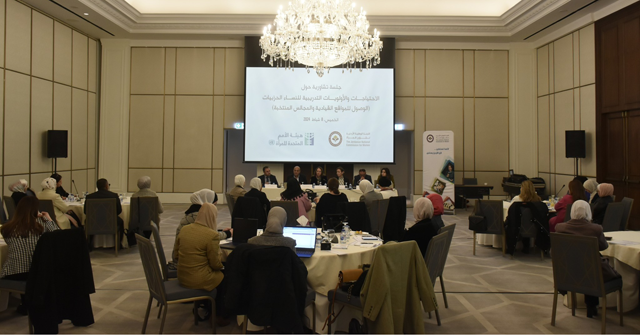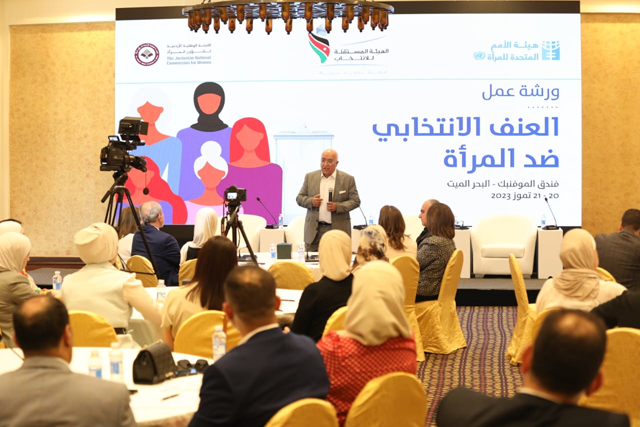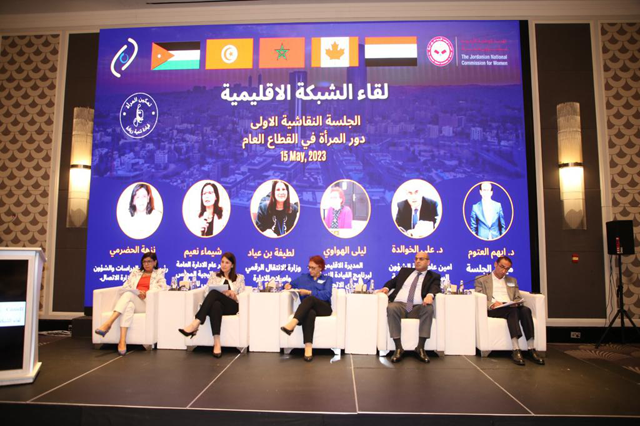You are here
JNCW holds session to boost women’s political participation
By Rana Husseini - Feb 12,2024 - Last updated at Feb 12,2024

The Jordanian National Commission for Women groups around 30 Jordanian women with political party affiliations to discuss means of reaching leadership positions in the legislative bodies (Photo courtesy of the Jordanian National Commission for Women)
AMMAN — The Jordanian National Commission for Women (JNCW) grouped around 30 Jordanian women with political party affiliations to discuss means of reaching leadership positions in the legislative bodies. The consultative session, which was held last week by the JNCW, focused on the training needs and priorities of partisan women and was entitled “Accessing Leadership Positions and the Elected Councils”.
“We aim to identify the most needed priorities for the political party women so that they can engage effectively within their parties and reach leadership positions in the party,” said JNCW Secretary-General Maha Ali.
She also said “We also aim to empower female candidates who are running for elections via their political parties’ lists”.
“These activities are also part of the framework of implementing initiatives and projects that are listed in the executive plan of the National Women's Strategy for 2023-2025," she added.
The executive plan is guidance for policymakers and donors on women's issues, with its six pillars: Economic empowerment, political empowerment and participation in decision-making, human rights, countering violence against women and girls, community culture and integrating gender perspectives in the public and private sectors.
Also addressing the female participants, Secretary-General of the Ministry of Political and Parliamentary Affairs Ali Khawaldeh said that the cooperation with the JNCW will pave the way for Jordanian women to actively participate in the upcoming parliamentary elections.
“The capabilities that Jordanian women have and the recent constitutional and legislative amendments qualify them to be in decision-making positions,” Khawaldeh stressed.
Meanwhile, Political Parties Registry Director at the Independent Election Commission Ahmed Abu Zeid said that recent figures indicate that two women reached leadership positions in the political parties.
Abu Zeid also highlighted that seven women occupy the position of deputy secretary-general and 25 women hold the position of assistant secretary-general of a political party.
The percentage of females who are members of political parties has reached 43.7 per cent, while the youth percentage was 37, according to Abu Zeid.
In 2022, the Senate and Lower House passed amendments to the Political Parties Law, which require political parties to increase the proportion of women and youth to at least 20 per cent within three years after their foundation.
There should be no less than 1,000 founding members of political parties, and at least 10 per cent should be women and young people between 18 and 35 years old, according to the new law.
The law also allows university students who join political parties to engage in partisan activities on campus without any infringement on their rights, as a bylaw will be issued to regulate such activities.
The Political Parties Law, along with the Elections Law, has been revisited by the Royal Committee to Modernise the Political System as part of its mandate to achieve political reform.
Assistant to the UN Women representative Bushra Abu Shahout praised the national efforts that are being led by the JNCW in collaboration with a variety of national partners.
“This kind of collaboration will work to strengthen the capabilities and skills of the women and the youth who are planning to run for elections,” Abu Shahout added.
The results of this consultative session will fall within the JNCW’s programme to enhance women’s participation in the upcoming parliamentary elections, in cooperation with UN Women, according to a JNCW press release.
The programme will include several activities including the development of a training guide for women wishing to run for elections and implementing a specialised programme to train the national team of trainers, according to the press release.
The programme will also implement over 18 training workshops for women who wish to run for office.
Related Articles
AMMAN — Enhancing women's political participation and addressing the challenges they face in the electoral process are shared responsibiliti
AMMAN — A regional network to ensure gender equality in the public sector convened in Amman on Monday to discuss ways to increase women’s ac
AMMAN — Women wishing to run in the coming parliamentary elections will have a chance to engage in a comprehensive training package that tar
















